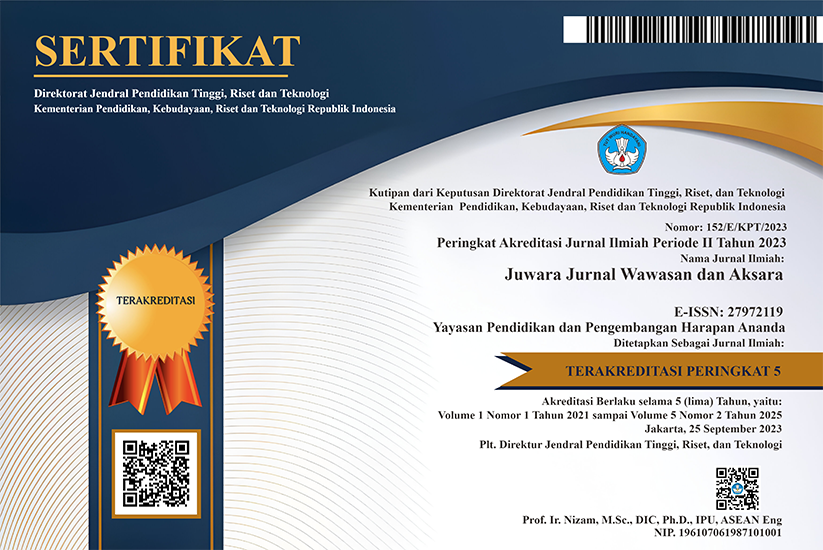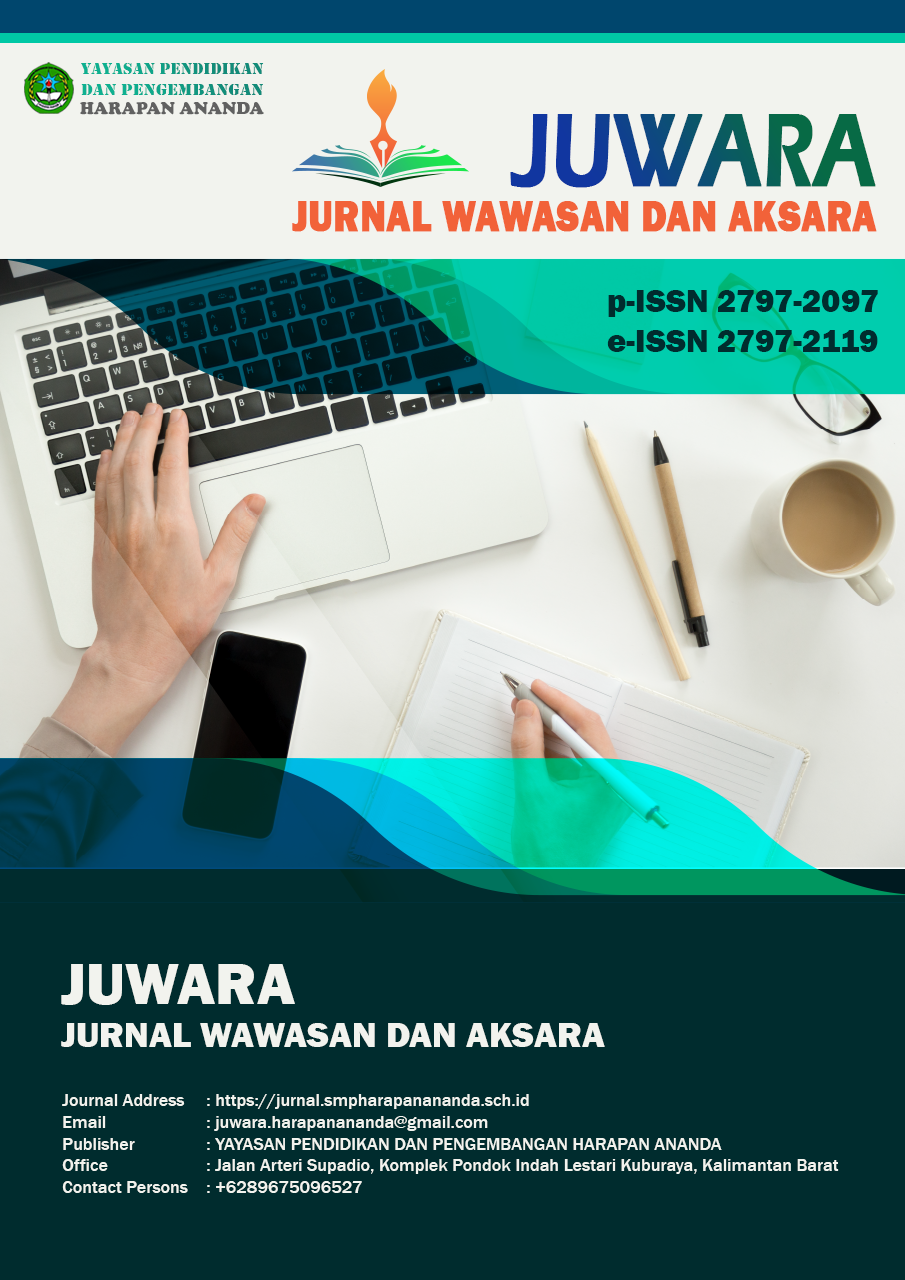Project based Learning Integrated with CAD Software to Improve Technical Drawing Skills
DOI:
https://doi.org/10.58740/juwara.v5i1.406Keywords:
cad software, experimental study, project based learning, technical drawing skillsAbstract
This study investigates the impact of Project Based Learning (PBL) integrated with Computer Aided Design (CAD) software on improving technical drawing skills among vocational high school students. The experimental design involved two groups: an experimental group that received PBL based instruction using CAD software, and a control group that followed traditional instructional methods. The results revealed a significant improvement in the technical drawing skills of the experimental group, as indicated by higher post-test scores compared to the control group. These findings suggest that PBL, when coupled with CAD tools, fosters active learning, critical thinking, and enhances students' ability to visualize and create accurate technical drawings. Additionally, the project-based approach promoted collaboration, real world problem solving, and digital literacy, key competencies in vocational education. The study also identified a substantial effect size (Cohens d=2.97), emphasizing the significant educational impact of the PBL CAD integration. Despite the promising results, the study highlights limitations in terms of generalizability due to the single school sample and suggests further exploration of affective and behavioral outcomes in future research. In conclusion, the integration of PBL and CAD software represents an effective pedagogical strategy for improving technical drawing skills and preparing students for the demands of the modern workforce.
References
Alvarez, M., Morón, A., Zaragoza, A., Ferrández, D., & Morón, C. (2025). Transforming Architectural Education: a Teaching Innovation Approach using Laser Scanning and Bim. In Inted 2025 Proceedings (pp. 5438-5444). https://doi.org/10.21125/inted.2025.1379
Al-Worafi, Y.M., Ali, S.M. (2024). Curriculum Reform in Developing Countries: Dentistry Education. In: Al-Worafi, Y.M. (eds) Handbook of Medical and Health Sciences in Developing Countries. Springer, Cham. https://doi.org/10.1007/978-3-030-74786-2_108-1
Barjuei, E. S., Capitanelli, A., Bertolucci, R., Courteille, E., Mastrogiovanni, F., & Maratea, M. (2024). Digital workflow for printability and prefabrication checking in robotic construction 3D printing based on Artificial Intelligence planning. Engineering Applications of Artificial Intelligence, 133, 108254. https://doi.org/10.1016/j.engappai.2024.108254
Bhardwaj, V., Zhang, S., Tan, Y. Q., & Pandey, V. (2025). Redefining learning: student-centered strategies for academic and personal growth. In Frontiers in Education (Vol. 10, p. 1518602). Frontiers Media SA. https://doi.org/10.3389/feduc.2025.1518602
Chang, J., Park, J., Tang, K. S., Treagust, D. F., & Won, M. (2024). How students develop collaborative drawing to represent the transmission of sound: An analysis of explanatory scientific drawings with discourse maps. Journal of the Learning Sciences, 33(1), 125-174. https://doi.org/10.1080/10508406.2024.2310237
Evangelista, E. D. L. (2025). Ensuring academic integrity in the age of ChatGPT: Rethinking exam design, assessment strategies, and ethical AI policies in higher education. Contemporary Educational Technology, 17(1), ep559. https://doi.org/10.30935/cedtech/15775
Fricticarani, A., Nimpagaritse, S., Fauzansyah, T. A., Abraham, Rahmadani, K., & Lelfita. (2025). Designing Android-Based Smart Apps Creator Learning Media to Improve Critical Thinking Skills. Vocational: Journal of Educational Technology, 1(2), 41–53. https://doi.org/10.58740/vocational.v1i2.300
Goshu, B. S., & Ridwan, M. (2024). Exploring the Role of Project-Based Learning in Fostering Critical Thinking Skills. Britain International of Linguistics Arts and Education (BIoLAE) Journal, 6(3), 149-166. https://doi.org/10.33258/biolae.v6i3.1201
Hakiki, M., Halomoan, Fadli, R., Hidayah, Y., Zunarti, R., & Yanti, V. Y. (2024). CT-Mobile: Enhancing Computational Thinking via Android Graphic Design App. International Journal of Interactive Mobile Technologies (IJIM), 18(13), 4–19. https://doi.org/10.3991/IJIM.V18I13.47711
Hakiki, M., Surjono, H. D., Wagiran, Fadli, R., Samala, A. D., Eliza, F., Fricticarani, A., Suryaningsih, A., & Hidayah, Y. (2024). Effectiveness of Android-Based Mobile Learning in Graphic Design Course for Digital Learning: The Development Research Study. International Journal of Information and Education Technology, 14(4), 602–611. https://doi.org/10.18178/IJIET.2024.14.4.2083
Hazrat, M. A., Hassan, N. M. S., Chowdhury, A. A., Rasul, M. G., & Taylor, B. A. (2023). Developing a skilled workforce for future industry demand: The potential of digital twin-based teaching and learning practices in engineering education. Sustainability, 15(23), 16433. https://doi.org/10.3390/su152316433
Ndjama, J. D. N. (2025). Bridging the Digital Divide in the Access and Usage of Technology Through Digital Literacy in Rural Vocational Schools. In Institutes of Higher Education (IHE) and Workforce Collaboration for Digital Literacy (pp. 91-124). IGI Global Scientific Publishing. https://doi.org/10.4018/979-8-3373-0004-7.ch004
Nuryanto, A., Ngadiyono, Y., & Widodo, S. F. A. (2025). Implementation of Project-Based Learning in CAD Education to Support Machine Design Drawing Skills. In The 8th International Conference on Education Innovation (ICEI 2024) (pp. 1434-1448). https://doi.org/10.2991/978-2-38476-360-3_122
Prabhu, R., Mendonca, S., Bellairu, P. K., & Shiri, N. D. (2024). Enhancing engineering education through mini project-based learning in computer integrated manufacturing laboratory: A student-centric approach. Innovations in Education and Teaching International, 1-15. https://doi.org/10.1080/14703297.2024.2362260
Tan, Q., & Li, H. (2024). Application of Computer-Aided Design in Product Innovation and Development-Taking In Industrial Design Process. IEEE Access. https://doi.org/10.1109/ACCESS.2024.3404963
Trisnawati, W., Sulistiyo, U., Sofyan, S., Haryanto, E., & Bashir, A. (2025). Systematic Literature Review: 21st-Century English Learning Media Utilizing Augmented Reality. Vocational: Journal of Educational Technology, 1(2), 63–73. https://doi.org/10.58740/vocational.v1i2.337
Totuk, O. H., Selvi, Ö., & Akar, S. (2025). Fused filament fabrication in CAD education: A closed-loop approach. International Journal of Mechanical Engineering Education, 53(1), 167-188. https://doi.org/10.1177/03064190231215307
Yassin, A., & Bashir, A. (2024). Student Satisfaction with The Use of Chat-GPT as A Learning Resource. Vocational: Journal of Educational Technology, 1(1), 1–7. https://doi.org/10.58740/vocational.v1i1.247
Yu, H. (2024). Enhancing creative cognition through project-based learning: An in-depth scholarly exploration. Heliyon. https://doi.org/10.1016/j.heliyon.2024.e27706
Zaher, A. A., Hussain, G. A., & Altabbakh, H. (2023). An Active Learning Approach for Applying STEAMeD-Based Education in Engineering Programs. International Journal of Engineering Pedagogy, 13(3). https://doi.org/10.3991/ijep.v13i3.34819
Zhou, X., & Wang, Y. (2025). Understanding competency requirements in the context of AEC industry informatization: policy insights from China. Engineering, Construction and Architectural Management, 32(2), 732-759. https://doi.org/10.1108/ECAM-11-2022-1080
Downloads
Published
How to Cite
Issue
Section
License
Copyright (c) 2025 Tengku Ahmad Fauzansyah, Roly Edyan, Muhammad Hakiki

This work is licensed under a Creative Commons Attribution-NonCommercial 4.0 International License.
JUWARA: Jurnal Wawasan dan Aksara provides open access to anyone so that the information and findings in these articles are useful for everyone. This journal's article content can be accessed and downloaded for free, following the creative commons license used.




















